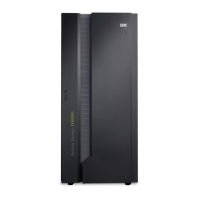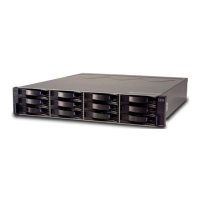The remote mirror and copy feature provides synchronous (Metro Mirror) and asynchronous (Global Copy)
data mirroring. The main difference is that the Global Copy feature can operate at long distances, even
continental distances, with minimal impact on applications. Distance is limited only by the network and
channel extenders technology capabilities. The maximum supported distance for Metro Mirror is 300 km.
With Metro Mirror, application write performance depends on the available bandwidth. Global Copy
enables better use of available bandwidth capacity to allow you to include more of your data to be
protected.
The enhancement to Global Copy is Global Mirror, which uses Global Copy and the benets of FlashCopy
to form consistency groups. (A consistency group is a set of volumes that contain consistent and current
data to provide a true data backup at a remote site.) Global Mirror uses a master storage system (along
with optional subordinate storage systems) to internally, without external automation software, manage
data consistency across volumes by using consistency groups.
Consistency groups can also be created by using the freeze and run functions of Metro Mirror. The freeze
and run functions, when used with external automation software, provide data consistency for multiple
Metro Mirror volume pairs.
The following sections describe the remote mirror and copy functions.
Synchronous mirroring (Metro Mirror)
Provides real-time mirroring of logical volumes (a source and a target) between two storage systems
that can be located up to 300 km from each other. With Metro Mirror copying, the source and target
volumes can be on the same storage system or on separate storage systems. You can locate the
storage system at another site, some distance away.
Metro Mirror is a synchronous copy feature where write operations are completed on both copies
(local and remote site) before they are considered to be complete. Synchronous mirroring means that
a storage server constantly updates a secondary copy of a volume to match changes that are made to
a source volume.
The advantage of synchronous mirroring is that there is minimal host impact for performing the copy.
The disadvantage is that since the copy operation is synchronous, there can be an impact to
application performance because the application I/O operation is not acknowledged as complete until
the write to the target volume is also complete. The longer the distance between primary and
secondary storage systems, the greater this impact to application I/O, and therefore, application
performance.
Asynchronous mirroring (Global Copy)
Copies data nonsynchronously and over longer distances than is possible with the Metro Mirror
feature. When operating in Global Copy mode, the source volume sends a periodic, incremental copy
of updated tracks to the target volume instead of a constant stream of updates. This function causes
less impact to application writes for source volumes and less demand for bandwidth resources. It
allows for a more flexible use of the available bandwidth.
The updates are tracked and periodically copied to the target volumes. As a consequence, there is no
guarantee that data is transferred in the same sequence that was applied to the source volume.
To get a consistent copy of your data at your remote site, periodically switch from Global Copy to
Metro Mirror mode, then either stop the application I/O or freeze data to the source volumes by using
a manual process with freeze and run commands. The freeze and run functions can be used with
external automation software such as Geographically Dispersed Parallel Sysplex (GDPS
®
), which is
available for IBM Z environments, to ensure data consistency to multiple Metro Mirror volume pairs in
a specied logical subsystem.
Common options for Metro Mirror/Global Mirror and Global Copy include the following modes:
Suspend and resume
If you schedule a planned outage to perform maintenance at your remote site, you can suspend
Metro Mirror/Global Mirror or Global Copy processing on specic volume pairs during the duration
of the outage. During this time, data is no longer copied to the target volumes. Because the
primary storage system tracks all changed data on the source volume, you can resume operations
later to synchronize the data between the volumes.
Chapter 3. Data management features
47
